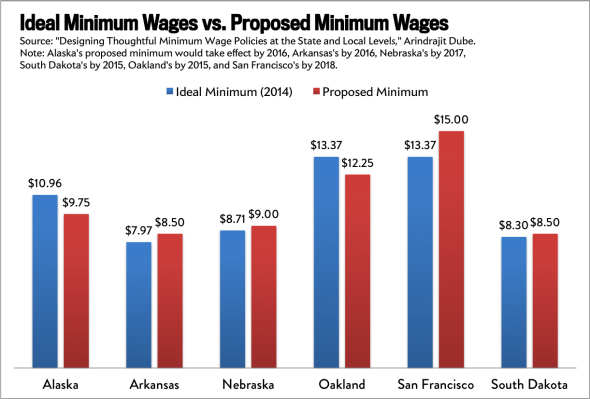Why Arkansas Might Soon Have One of the Most Progressive Minimum Wages in the Country

Photo by Reuters
Democrats don’t have a whole lot to look forward to during tonight’s elections, what with the Republicans looking poised to take over the Senate and make President Obama’s final years in office as excruciating as possible. But there’s at least one silver lining for the left: Four states—Alaska, Arkansas, Nebraska, and South Dakota—will vote on ballot initiatives to raise their minimum wages. So will the cities of San Francisco and Oakland. All of the referendums look set to pass. As Steven Greenhouse of the New York Times wrote yesterday, “These measures are so overwhelmingly popular in some states, notably Alaska and Arkansas, that the opposition has hardly put up a fight.”
These hikes may not seem as big a deal as, say, San Francisco’s referendum, which will move the minimum to $15 an hour by 2018. But in some ways, the Arkansas referendum, which would move the state’s wage floor to a comparatively measly sounding $8.50 an hour by 2017, is just as significant—both politically (it proves that higher pay is a popular idea even in a Red state) and economically.
That's because what counts as high pay in high-rent San Francisco is different from what counts as high pay in low-rent Arkansas. There might not be a single perfect wage floor. But University of Massachusetts–Amherst economist Arindrajit Dube—perhaps the foremost minimum wage researcher on the left—has argued that states (and cities) would be well-served to set theirs at 50 percent of the local median wage for an hourly, full-time worker. While 50 percent isn’t a magic number per se, it is “in line with the international average and the U.S. historical average during the 1960s and 1970s,” when the minimum’s inflation-adjusted value was at its peak.
According to Dube’s calculations, Arkansas would be best off targeting a wage floor around $7.97. Even after accounting for a few years of inflation, $8.50 would probably overshoot the mark. In fact, you might say Arkansas is actually passing a living-wage law—according to MIT’s living-wage calculator, a single adult can get by in the state on $7.86 per hour.
If Arkansas, alongside South Dakota and Nebraska, votes to move near or past the 50 percent mark tonight, it'll be in a class nearly by itself. As shown in the table below, no state currently has a minimum equal to Dube's target of half the median wage. Barring a lot of inflation, Vermont and Hawaii should get there by 2018, but that's it. (The city of Seattle, of course, is slated to blow way past the 50 percent mark as its own minimum rises to $15 an hour.) In short, by night's end, three red states could have some of the most progressive wage floors in the country. Who would have thought?

